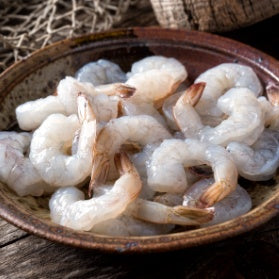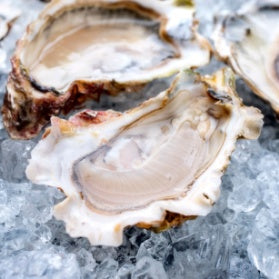Your Cart is Empty
FREE SHIPPING ON ALL ORDERS OVER $125!
FREE SHIPPING ON ALL ORDERS OVER $125!
FREE SHIPPING ON ALL ORDERS OVER $125!

TL;DR: Kelp is a nutrient-rich, sustainable superfood with numerous health and environmental benefits. It's a versatile sea vegetable that supports metabolism, thyroid health, and immune function while also combating climate change.
Key Takeaways:
Kelp is one of the least-understood seafood products. That’s unfortunate because this powerhouse is one of the healthiest, most sustainable seafood products there is!
Kelp has been steadily gaining notoriety and increasing in popularity. This brown seaweed subspecies is acclaimed for its sustainability profile. It boasts a “superfood” nutrition profile and remarkable ocean-purifying characteristics. It even supports local fishing families and the coastal economy.
Vegan and vegetarian friendly, this sea vegetable can be consumed hot, cold, raw, cooked, dried, or powdered. Basically, you can enjoy kelp any way you can imagine. Increasingly, you’ll see it listed as an ingredient in everything from eye cream to shampoo!
Sea kelp’s benefits extend from metabolic support (which aids weight loss) to immune system support, thyroid health, and more! Ready to learn more about what kelp is good for and how it can help you?
North Coast Seafoods is here to kelp demystify this sustainable, edible superfood. Plus, we’ll answer your other frequently asked questions about fish and seafood. Keep reading to learn more about what kelp is used for in the culinary world (and beyond)!
Kelp, or sea kelp, refers to a group of large brown seaweeds with around 30 different species found in oceans worldwide. But think of this as a sea vegetable.
While it grows naturally in the ocean, it can also be farmed and harvested for food. Examples include kelp noodles, dried kelp, and kelp wrappers for sushi (similar to nori).
Because of its salty umami flavor, kelp can even be used as a seasoning.
Kelp has a wide range of applications beyond food, too! You’ll find kelp as an ingredient in many cosmetics and personal care items. A few examples include shampoo, facial cream, lotion, and even toothpaste!
Don’t be surprised if you see kelp in other unexpected places as it grows in popularity. We’ve spotted kelp as a key ingredient in pharmaceuticals, fertilizers, pet food, and more!

Photo Credit: Atlantic Sea Farms
If you’re a vegan or vegetarian – not a pescatarian – seafood is off-limits. Right? Not so fast.
Sea kelp, and other seaweed varieties for that matter, are considered seafood. Therefore, you can eat seafood if you’re vegan... if the seafood product in question is kelp!
Our Kelp Meatballs are also plant-based, gluten free, dairy free, and soy free.

North Coast's Salmon-Kelp "Ocean Burger" (SHOP HERE)
The practice of farming kelp in “kelp forests” is a 100% sustainable and regenerative farming practice. In fact, it improves the ocean water quality where it is grown.
Kelp is also a zero-input crop. It does not require any:
Kelp can grow and be farmed anywhere seaweed grows. For example, Maine Sugar Kelp is cultivated during the fall-winter off-season by local fishing families. The Kelp farming process follows these steps:

Kelp farming is incredibly carbon-efficient, climate-friendly, and good for the ocean! Kelp absorbs excess carbon and nitrogen from the ocean, which improves water quality and locally mitigates the effects of ocean acidification. It’s naturally easy-to-grow and low-maintenance.
Kelp is a food that packs a punch! It’s one of the most nutrient-dense foods on the planet, packed with minerals, vitamins, and antioxidants. Don’t take our word as medical advice by any means, but kelp offers a variety of health benefits!
Just a few kelp benefits worth noting include:
Safe to say that kelp is a “superfood”! That said, you should be sure to speak with a professional before taking kelp supplements if you’re a woman who is:
The reason behind this is that kelp is actually a fantastic source of iodine. While most people need iodine to stay healthy, members of the above populations typically need to monitor their intake. Therefore, consuming kelp while pregnant is only safe in moderation. Always be sure to consult your doctor if in doubt!
Our team at North Coast Seafoods proudly partners with local suppliers, including Atlantic Sea Farms, to source our kelp. It’s grown and hand-harvested by local, independent family farmers. Much of our kelp grows in the clean, cold waters of the Gulf of Maine.
Maine-grown Kelp offers a promising way for fishing families to diversify their income streams and support their livelihoods during the lobster off-season.
Kelp (multiple species) is also verified by the Gulf of Maine Research Institute (GMRI). It is officially a Gulf of Maine Responsibly Harvested ® species.

Photo Credit: Atlantic Sea Farms
Maybe you want to incorporate a kelp salad into your daily meal plan. Perhaps you want to eat kelp in a more adventurous way. How does kelp ice cream sound?
Whatever your fancy, we encourage you to try kelp today! This sea vegetable is green (in more ways than one), not to mention delicious and nutritious!
Looking to incorporate kelp into your diet stealthily? Try our salmon kelp ocean burgers, Seaweed-ish™ Kelp Meatballs, or try a kelp salad alongside one of our other delicious products!

Our kelp meatballs were developed by our in-house Chef of Research and Development, Andrew Wilkinson. These delicious “kelp meatballs are a one-of-a-kind plant-based products that are trendy, delicious, healthy, and effortless to prepare.
Kelp meatballs are naturally vegan and gluten-free. They boast a clean-label list of ingredients composed primarily of kelp, green chickpeas, brown rice, basil, extra virgin olive oil, and spices. This winning combination rewards a bright, herby, fresh flavor profile and umami richness.
Check out what the press is saying about our kelp products.

You might be surprised to learn that kids LOVE kelp! Kelp meatballs and sliders have a unique, savory flavor, and ours have a reputation as the highest quality, most unique plant-based meatballs and sliders on the market.
In recent years, K-12 schools, colleges, and universities across the country have added our Seaweed-ish™ Meatballs and Sliders as a plant-based option onto their menus. As a result, we’ve seen how much kids of all ages (and their teachers and professors) love kelp meatballs and sliders.
Why add kelp to your school lunch menu? As one of the most nutrient-dense foods found on earth, kelp has the power to fuel quality learning and brain health. Kelp is a great source of iodine, magnesium, potassium, iron, folic acid, Vitamin A + B12, and has more calcium per ounce than MILK! That makes it the perfect entrée for growing kids who may toss those tiny milk cartons away unopened.
Plus, Kelp delivers a win from every perspective. Kelp is sustainable and renewable, good for the ocean (and climate), good for the U.S. coastal economies and fishermen, and good for you!
We’d love to help you add kelp sliders or meatballs to the menu at your institution. Get in touch to discuss a wholesale arrangement. We’re here to help!
Seaweed-ish™ Kelp Meatballs and Sliders are available now for wholesale orders! Our Salmon-Kelp Ocean Burger and Kelp Meatballs are also available for direct home delivery.
To order or learn more about how to become a distribution partner or retail customer, please email customerservice@northcoastseafoods.com. You can also reach out via our Contact Us page.
Comments will be approved before showing up.



Sign up to receive the best seafood recipes, first access to new products, exclusive discounts and more!
Susi Brodie
January 28, 2025
Where can I buy these products locally? I’d really love to try both the kelp burgers and the kelp balls. I also be interested in helping others learn about these products. I think they’d be a real hit here in Rhode Island and Connecticut